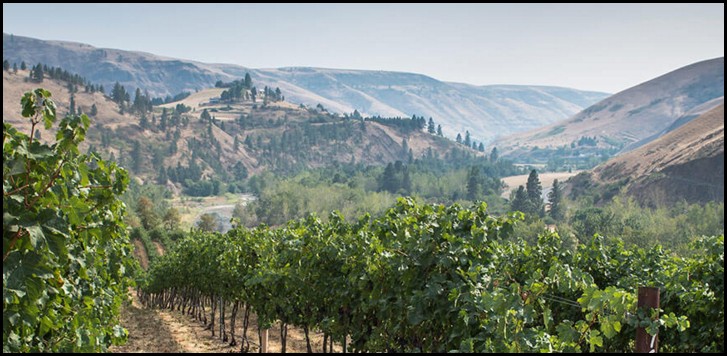Lewis Clark AVA
by Maggie Elliot
 |
| Photo Credit: Susan R. O'Hara |
An AVA, or “American Viticulture Area” is a grape-growing
region producing distinct wines because of the unique terrain, climate, soil,
and other factors of the land. In May, Idaho’s third AVA was designated, the
Lewis Clark Valley AVA. Bordering the Lewiston and Clarkston state lines, the
AVA is shared by two states, with twelve percent in Washington and the
remaining in Idaho.
Vineyards in the Lewis Clark Valley AVA are nestled between
the steep Bitteroot Mountains. The deep, v-shaped valleys create ideal air
drainage for wine grapes, inhibiting mold growth, lending frost protection, and
the presence of cool summer nights work to develop acid retention. The soil is
composed of silt based mollisols, carrying a high water holding capacity, promoting
the need for minimal irrigation. The Lewis Clark Valley is set apart from other
AVAs in the Northwest, as its landscape was not carved from ancient Missoula
floods. Instead, the valley was created by the Snake-Clearwater River, with its
soil a result of an accumulation of windblown loess trapped in the canyon
boundaries.
An emerging wine industry in Idaho sparks the potential for
a multitude of careers. Not only do wineries depend on viticulturists and
enologists, they also need professionals in sales and marketing, artists to
design labels, tasting room attendants and cellar masters. They need
accountants and human resource consultants, as well as mechanics that can
repair specialized equipment.
At the same time, the industry will create a demand for
logistical needs in the production of wine. Bottles, corks, labels, barrels,
bottling lines, tanks, hoses, yeast, and the vast selection of inputs winemakers
use to characterize their blends. Once the wine is made, wineries will need
dependable transport to ship their wine to customers and distributors in a
temperature controlled environment safely.
Every successful industry has creative agriculturists behind
it who are committed to delivering the best product to the consumer. Whether
it’s developing disease free rootstock in a vineyard nursery or selling a
bottle of wine in retail, students engaged in agriculture may be surprised to
find this blossoming industry has a spot for everyone.
Of the 302,000 acres within the boundaries of the AVA, only
80 acres are currently in production. The opportunity this region holds for
wine production is remarkable and exciting. As graduation inches closer, keep
your eye on the wine industry in Idaho. It may hold the key to a rewarding career.
 |
| Photo Credit: Wines Northwest |
Comments
Post a Comment